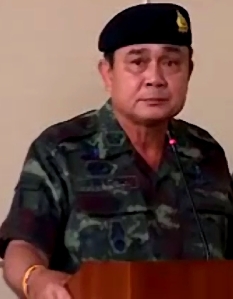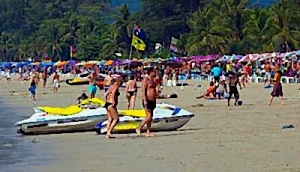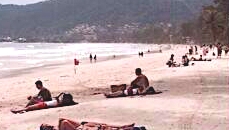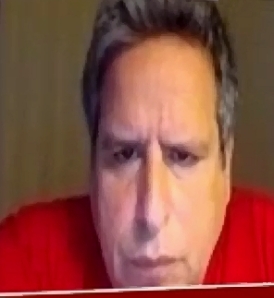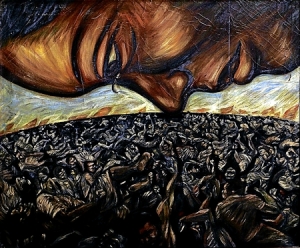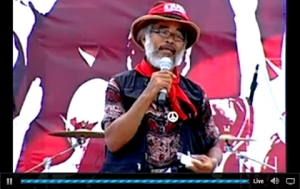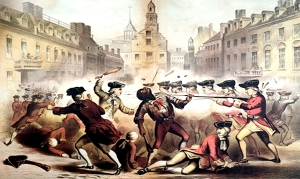by Marque A. Rome
Good Lord! Who’d ever have thought it? Gen Prayuth Janocha: dictator of Thailand and closet comic. It’s no concoction of my imaginings, it’s the simple unvarnished truth. Any who tar Prayuth as a power hungry, megalomaniac need to watch a few of his news conferences (here is one).
Oh, I know, when he declared martial law, and then again, a few days later, in announcing the military takeover, he appeared rather wooden. ‘Rather wooden’ — nah, let’s be frank, he had no more personality than an automatic answering service. “To escape this message, press 9.”
No, no, no! It was stage fright. Prayuth is special among public speakers in performing better without a script.
His brand of humour, however, relies on droll, laconic delivery and a stance derived from ‘nak leng’ or mafiosi — like Marlon Brando’s character in “The Godfather”. Owing to his position, and the dramatic circumstances under which it was achieved, hearers (especially those politically opposed to his regime) take him at his word and think the dull menace of his expression seriously reflects his character.
Stuff and nonsense, I say! Beneath the Darth Vader-like visage beats the heart of a stand-up comic. Far from trying to instill fear, Prayuth, I am confident, is bent on leaving his auditors in stitches. Of course, it would spoil the act if he let on that his target is really laughter. He is, anyway, obviously a past master of this type of humour and so never drops out of character.
Those inclined to see murder and mayhem in his every nod and wink, however, walk away in fear.
But, enough of mere assertion: let us assay the facts and see whether the actions of Prayuth and his backers amount to anything more sinister than a good joke.
As those who have lived in such interesting times and places attest, proclamation of martial law by the generals means soldiers will soon be going house-to-house in search of opponents and slaying or arresting any who interfere. The life of the people changes dramatically. Any caught outside without proper papers face summary justice. Business slows down, schools close, tourism vanishes. People might grumble about issues more pressing than the quality of available beer — but that they know grumbling is dangerous and so refrain.
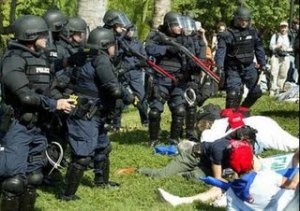 In most places, this is what martial law looks like.
In most places, this is what martial law looks like.
When martial law co-incides with seizure of the state, it looks like the sack of Rome: armed military presence is everywhere; buildings are peppered with bullet holes; scions of the leading families are hauled from their beds and shot in the street; the women moan, sirens wail, military transports crowd the roads and lines of refugees laden with what remains of formerly flourishing households straggle whither they know not — but away, away, away!
Now, answer me honestly, does the scene in Thailand have even a remote resemblance to the above?
Hardly. People are too busy applauding the soldiers for clearing the beaches, going after encroachers on National Park lands, and paying farmers their arrears. Here in Phuket, personally I have yet to see any soldiers, though certainly I’ve read of their doings.
As a case in point, take the beach clean-up: like JC driving the moneylenders from their temple stalls, a team of 14 police and soldiers have driven Phuket’s myriad beach vendors off our strands and into search for other forms of employment.
That’s right, 14 people. They had plenty of help. At Ao Por, for example, local villagers, together with police and soldiers under the direction of tambon Pa Klok administrative organisation chief Panya Sampaorat, tore down their own structures. Ao Por is Phuket’s principal tourist vessel port on the east coast, whence excursions by the hundreds embark for the other-worldly landscapes of Phang-nga Bay. The beach-side businesses, many built right on the narrow strand, were deeply entrenched in the community and of long-standing.
One might expect locals to protest their destruction; or, if too afraid of consequences to show opposition, to display a sullen reluctance to smashing their own rice bowls. Instead, they embraced the concept with enthusiasm and cleared the beach for the first time in over twenty years. Something similar happened at Patong beach, where vendors were even more deeply entrenched and where more money was at stake. For the first time since the mid-’80s, Patong beach is clear of sun-beds.
Local authorities, though well aware beach vendor activities were illegal, chose to ignore them. I was at a Phuket Tourism Business Association meeting in the mid-nineties, called as a result of jet-ski operator depredations, which were then causing quite a stir in the press. The police representative said quite frankly: “You want me to order my men to drive jet-ski vendors off the beach because the boats are illegal. Fine. But I won’t do it until you find something else for those people to do. It is otherwise too dangerous. So either find operators an alternative livelihood or make their boats legal.”
Eventually, rather than face fury from the operators and their employees, the government legalised their boats. The same has been done over the years to accommodate a plethora of encroachers — many, as with the so-called ‘beach club’ operators, with businesses promoting social and cultural degeneracy.
But Gen. Prayuth and his associates have, to the wonder of all, cut through the red tape. A considerable amount of public property is now clear of encroachers. They are doing it, moreover, with active support from the very people being driven away. It’s miraculous, and a gag even JC couldn’t pull off, for, as you perhaps recall, he was arrested and crucified after ridding the temple of its vendors.
I’ve a feeling, though, Prayuth is just a little to smart for much of his audience. Some people, notably those abroad, can’t bring themselves to laugh. Since 2009, Travel + Leisure Magazine ranked Bangkok as the world’s no. 1 city for tourism. This year, however, Bangkok didn’t make the Top 10. The editors put stuffy Kyoto first. even the dour Spaniards of Seville were awarded a higher rung than the free-wheelers of Bangkok.
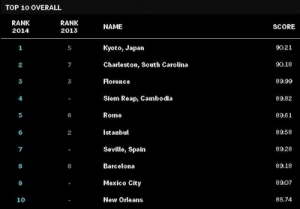 Bangkok is off Travel + Leisure’s list.
Bangkok is off Travel + Leisure’s list.
What changed? Certainly not Bangkok, where the eight-month long protests that tore the Shinawatras from their stranglehold on power were mounted as entertainment. I hardly think the proverbially serious Japanese and Spaniards have changed. What changed was the government in Bangkok, and with it U.S. policy towards Thailand. Travel + Leisure is published by Time, Inc., a major cheerleader of American policy initiatives, however insane. The U.S. rather publicly has snubbed the junta, and demanded the military hand over to civilian, democratically elected government.
As it happens, Thaksin Shinawatra long ago retained American lawyer Robert Amsterdam to handle his public relations abroad. Amsterdam is the very embodiment of what are sometimes termed ‘shyster lawyers’. He is not funny. He is scary, but astonishingly influential. He has, for example, raised Megaupload founder Kim Dotcom from virtual death, after the latter’s arrest by U.S. Gestapo for copyright infringement.
Thaksin is getting his money’s worth from Amsterdam: Bangkok no longer rates as fun city and the U.S. Embassy in Bangkok didn’t invite the country’s new administrators to dinner on the 4th of July, U.S. independence day. Whether Prayuth realises it or not, Amsterdam is his nemesis, and thus far it is Amsterdam who is winning the public relations war.
I think this result is largely owing to language. Personally, there’s no doubt in my mind as to whom I would rather sit down and chat with over dinner: Prayuth, with his dry wit, wins hands down. Amsterdam is pushy, strident, and constipated. Moreover, I expect he has bad breath. Dinner with him would be torture, I am nearly certain.
But the world listens because, whatever his other failings, he is an accomplished speaker of English, whereas Prayuth is at his best speaking in Thai off the cuff. A different perception — one more nearly consonant with how Thais themselves feel about the coup and what has ensued — might obtain if only Prayuth’s wit and wisdom could be translated into English.
But, alas for that. Wit is notoriously hard to translate. I could translate Bill Murray’s deadpan line, “I always like to say to people who want to be rich and famous, try being rich first — see if that doesn’t cover most of it,” but I doubt it would be taken as other than a sermon in Thai. No one would think it funny. Yet it is, brilliantly so.
Thus Prayuth, when he points out that, “People say I like to fight with the press, but I don’t like to fight with the press — whatever for?” is likely doomed to be misunderstood by those incapable of understanding the dry wit that informs his speech.
For those who do, though, trust me, he’s a breath of fresh air in a crowd where halitosis has been the norm.

